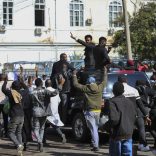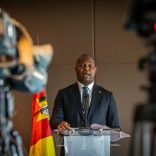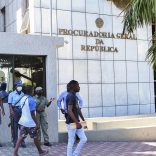Mozambique: President swears in 'dream team' Council of State - Photos
Response to Kroll: CIP, bondholders: don’t pay; Government secrecy highlighted; Defence by those criticised

File photo
The Executive Summary of the audit of the 2013-14 $2 billion secret loans by Kroll was released during the three-day weekend of Independence Day, 25 June. The report was a damning indictment of all involved. “Gaps remain in understanding how exactly the $2 bn was spent, despite considerable efforts to close this gap,” and more than half cannot be accounted for, Kroll said. The Executive Summary is in English and in Portuguese.
Not surprisingly, there was a flood of comment during the week, following five threads:
+ Renewed calls to not pay at least part of the debt.
+ Surprise at the government’s refusal to provide information requested by Kroll which means that more than half the money cannot be traced, which presents problems for donors and the IMF which demanded the audit.
+ Calls for prosecutions of those responsible.
+ Heavy criticism of the Attorney General’s Office (Procuradoria-Geral da Republica, PGR) for lack of commitment and for failing to force witnesses to give evidence. And
+ Defence by those criticised, including an unexpected defence by Antonio do Rosario, identified by Kroll only as Person A, director of Economic Intelligence in the security services (SISE, Servicos de Informacao e Seguranca do Estado) and who is also CEO of the three companies receiving the loans. He claimed the project was a success and that he was carrying out “a noble mission to serve the country and people”.
There were credits to three private companies owned by the state and controlled by SISE: an $850 mn Eurobond to Ematum, the Mozambique Tuna Company, which became known in 2013, and two syndicated loans which remained secret until 2016 – $622 mn to ProIndicus and $535 mn to MAM (Mozambique Asset Management).
Don’t pay
“The Mozambican State should not pay the debts contracted by the three companies, since the proceeds did not benefit the State in any way; the guarantees issued in favor of these companies, in violation of the Constitution of the Republic, should become null and void so that they cannot be invoked to justify the payment of the debt by the State,” declared the Centre for Public Integrity (CIP) in response to the Kroll report ( click here to access the CIP report).
“Taking together the Kroll report and the findings of the Mozambique Parliamentary Commission and Administrative Tribunal, it is evident that there is no basis – in either Mozambican or English law – for the Mozambique government to honour the purported guarantees of the Proindicus and MAM loans,” declared a statement by bondholders:
The Wall Street Journal (29 June) notes that “Kroll found that the process for providing the guarantees was inadequate, violated Mozambican budget laws and may have involved conflicts of interest.” The Mozambican government has not been repaying these debts and there is a growing move to continue with that strategy, and simply not pay.
The bondholders have their own interest in this line, however. Their argument about the illegality of the MAM and ProIndicus syndicated loans applies also to the original Ematum bonds, but in March 2016, when the two syndicated loans were still secret, the government issued new bonds to replace those issued by Ematum, a private company, effectively nationalising the debt. The bondholders argue these are legitimate government bonds which should be repaid (even though they replaced illegitimate private bonds issued by Ematum), while the two syndicated loans were not nationalised and remain illegitimate.
The reference to English law is that the loan and bond contracts say that if creditors want to take action with respect to the debts, it will be in an English (not British) court. The bondholders view is that the illegal state guarantees on the MAM and ProIndicus loans would not be recognised by an English court, which should strengthen those in government and civil society who want government to refuse to pay.
Failure to cooperate
“There has been virtually no attempt by the Government of Mozambique to collaborate with Kroll in carrying out the independent audit. This fact is repeated throughout the 64 pages of the Executive Summary of the report, in which Kroll complains of the lack of access to sources of information that were essential for the conduct of the audit and clarification of the facts surrounding the hidden borrowings,” notes CIP. It was not just the three companies (EMATUM, ProIndicus, MAM) that failed to provide information, but also “the Ministry of Economy and Finance and the State Information and Security Services (SISE) – key entities with knowledge about the transactions – also shied away from providing information.”
“This lack of cooperation therefore reveals that, during the 6 months of the international audit, the President of the Republic and his Government lied to the Mozambican people by stating repeatedly and publicly that the institutions concerned had every interest in the audit and would therefore fully clarify the dark areas around the case of the hidden debts,” CIP concludes.
Many in government thought that all that was required to restart international aid was to carry out the audit, and this impression was reinforced by the donor community. But Zitamar (30 June) notes that donors and the IMF had not expected the extent of non-cooperation, leaving the donor community confused and divided. By failing to cooperate, did the government lie again, just as it did over the secret debts? Some consensus will need to be reached before the next IMF mission arrives in Maputo next week, 10 July.
Savana (30 June) reports that “there were ‘orders’ to create a ‘smoke screen’ around Guebuza during hearings conducted by Kroll’s auditors. In the report there is no clear reference to Guebuza and his family.”
Attorney General criticised
CIP in a 28 June statement called on the Attorney General’s Office (Procuradoria-Geral da Republica, PGR) to prosecute those who failed to provide information, because that action was criminal behaviour as the audit was a PGR investigation. CIP issued a second, stronger statement today (Sunday 2 July) stressing that Kroll was reporting to the PGR and stresses the PGR leadership in its report, yet the PGR showed “a serious lack of commitment” and “serious flaws in leadership”. In particular, it cites the failure to cooperate of “Person A”, Antonio Carlos do Rosario – a SISE Senior Official and CEO of MAM, ProIndicus and Ematum. “Why did this high state institution [PRG] tolerate Person A’s refusals to cooperate with Kroll?” The Penal Process Code makes cooperation with an investigation obligatory, so why was Rosario not arrested when he refused to cooperate, asks CIP? And why did the President not take action against the Attorney General and Rosario? The failure to act raises the question: “To what extent does the President of the Republic, who was Minister of Defence at the time of the contracting of the debts, have clean hands in this sad episode?”
The Budget Monitoring Group (Forum de Monitoria do Orcamento) called for the immediate publication of the full report, and published a detailed legal justification (O Pais 30 June). Under the agreement with the Swedish embassy, which funded the audit, the PRG has 90 days after publication of the Executive Summary to publish the full audit, to allow more time to bring charges against individuals. But 90 days from 24 June is just before the Frelimo congress in September – so further delays are to be expected.
do Rosario defending the Motherland against Kroll
“I threw two of them [Kroll investigators] out of my office because they wanted details of questions about state security,” wrote Antonio Carlos do Rosario in a bizarre letter circulated on WhatsApp. He is a SISE Senior Official and CEO of MAM, ProIndicus and Ematum, and confirmed that he is the Person A of the Kroll report and that he refused to give information to Kroll. (Bloomberg 30 June, https://www.facebook.com/eduardo.calane/posts/10213408819394348)
“We took an oath to give our lives for the Motherland. We should not be embarrassed by the fact that our names and, perhaps, our honour, are being besmirched. And by whom? For Kroll, we know who they really are and what they want. I am happy to see the very negative way they attack me, because this proves that we do not give in to pressure and we are not afraid, even knowing where it comes from. We fought hand to hand. Everything indicates that we are still at the beginning of the fight.”
“We have been able to defend the Motherland from unfounded suspicions. This is what matters. Today no one will say that the projects do not exist and that money has been diverted,” he continues. “Today we have a navy with means and people to do what a navy of a country with 2800 km of coastline must do. In 2010, we did not have a simple boat to hunt down pirates… Today we already have two shipyards (one in Pemba and another in Maputo) with state-of-the-art technology that enables MAM to work with international giants to provide services to the oil & gas industry. Today ProIndicus is enabled to comb our Exclusive Economic Zone (EEZ) and not to allow that the unlawful acts that once happened to continue to happen.”
Rosario claims that “Ematum began operating in December 2014 and even started to export. … Kroll knows who sabotaged our work so that Ematum would be paralysed and, thus, forcing the sale of the boats to economic agents we identified. But Kroll chose to protect him. Why?” And he refers to “those who desperately want us (the Defence and Security Forces) out of the companies and the chess game of business in order to take the country by force.”
And he claims “the countries that commissioned the audit [are angry with Mozambique] for having switched from a satellite service provider to a Mozambican because we have more control over the images and our space.”
He concludes: “Remember the heroic resistance of our ancestors and the sacrifice of those who fought for the independence of our country. Today our economic independence is at stake. And this will not be given to us with a kiss. … The Fight Continues! Economic Independence or Death, We Will Win!”
Defending their position
Various of those accused by Kroll have been defending their positions. Credit Suisse refused to comment on the very damaging allegation by Kroll, that the bank: 1) “imposed a number of ‘preceding conditions’ that needed to be met before it would approve the loan financing”, 2) that the bank removed those conditions and organised the loan without those conditions being met, and 3) that the bank did not provide any explanation of why this was done.
Instead Credit Suisse did object to the a much less damaging allegation relating to fees. VTB also objected on the fees issue, saying that Kroll’s report of a $35 mn fee for the $535 mn loan to MAM “is deceptive and incorrect,” but did not supply a correct figure. Press spokespeople for both banks (John Merva of Hudson Sandler for VTB and Caroline Parker of FTI Consulting for CS) contacted this newsletter to issue statements on fees, but would not answer further questions. In separate statements, VTB also said it is now ready to talk about restructuring Mozambique’s debt (Reuters 5 June) and that “the government of Mozambique confirmed to us that they were following the necessary internal and external legislation and that comprehensive information on the transactions was disclosed to creditors and investors. VTB followed strict internal policies in the local deals and hired the best international legal advisors to consult the bank on these transactions.”
The Wall Street Journal (24 June) said “the Kroll audit confirmed reports that the banks had carved $200 million in fees out of the $2 billion total – a slice well above what is typical for this market.” Credit Suisse says that its bank fees of $23 mn (Kroll says $24 mn) are reasonable but that it is wrong to attribute to Credit Suisse a further $141 mn in “contractor fees” or “subvention fees”. These appear to be a form of “cash back” in which the Credit Suisse, as arranger of the loan, immediately gave back to the lenders $141 mn and only actually gave to Privinvest $1307 mn instead of the $1448 mn as officially reported in the loan documents. This meant that the lenders were being paid interest on $1477 mn ($1448 plus the Credit Suisse $24 mn) but Privinvest only received $1307 for work for Ematum and ProIndicus. The “cash back” appears to have been a way to make the high interest rate look lower, yet another twist to the secret loans saga. (The official interest rates were Libor+3.2% on the Proindicus loan and Libor+3.7% on the Ematum loan; Libor at the time averaged about 0.6%. So the real interest rates for the loans, after the “cash back”, were about 0.5% higher, Libor+3.7% and Libor+4.2%)
Palomar is a Privinvest company and was cited by Kroll as having received fees and being involved in the Mozambique project. A statement issued by Denesha Brar of Portland Communications said Kroll was negligent in not meeting with Palomar and that the report is “flawed and misleading.” Palomar still wants to meet with Kroll, it says.
The Privinvest case is made by lawyers Simkins, who attack this newsletter and its editor, which it says used “inflammatory and misleading language”, “is clearly intentionally salacious and provocative to fit his preconceived narrative,” “is distorted and inaccurate”, “takes findings made by Kroll out of context” and “misinforms the reader”. “No allegation of ‘guilt’, criminal or otherwise, has been made against our client”. Simkins says that Privinvest did offer to share more material with Kroll but demanded “a non-disclosure agreement”, which Kroll refused. Thus Privinvest would not release material it considered confidential. It argues the Prinvest was not required by Mozambican law to provide additional information or more detailed invoices. The missing documentation could also explain the difference of $700 mn between the invoiced values and Kroll’s estimate of their real value. Kroll is also accused of having “failed to appreciate that the Ematum contract consisted of more than the provision of assets only.”
Identifying the Kroll pseudonyms
In the Executive Summary, Kroll only identifies people by letter. But it provides enough context that it is possible to identify most of them, especially by comparing information given to Kroll with that given by named individuals to the parliamentary commission.
Person A has already identified himself as senior SISE official and CEO of the three companies, Antonio Carlos do Rosario.
Savana (30 June) identifies most the rest as:
Person C is named as former finance minister Manuel Chang, who told Kroll he consciously violated the agreed budget laws by approving the government’s guarantees for the Mozambican companies because SISE officials convinced him that it was in the interests of national security.
Person D is Isaltina Lucas Sales, now Economy and Finance vice minister, but she was national director of treasury when she signed some of the guarantees.
Person E is former SISE director Gregório Leão.
Person F is Lagos Lidimo, named director of SISE in Janauary, replacing Leao.
Person I is Defence Minister Salvador Mtumuke who refused to sign a list of military equipment allegedly received, but that he said he knew nothing about.
By Joseph Hanlon













Leave a Reply
Be the First to Comment!
You must be logged in to post a comment.
You must be logged in to post a comment.